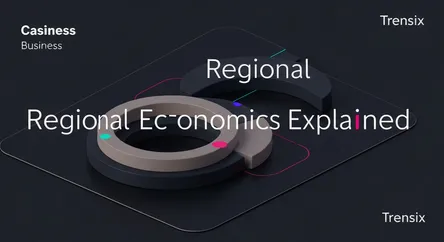Business
Regional Economics Explained

Discover regional economics, the study of economic activity in specific geographic areas and how it impacts local growth, jobs, and policies.
What is it?
Regional economics is a branch of economics that focuses on the economic issues of specific geographical areas, which can range from a single city to a multi-state region. It examines why some regions prosper while others decline, analyzing factors like location, labor markets, natural resources, and infrastructure. Unlike national economics, which looks at the country as a whole, regional economics dives into the unique economic conditions and challenges of a particular place. It often uses tools from geography, sociology, and urban planning to understand the complex interplay of forces that shape a local economy.
Why is it trending?
The field is gaining prominence as governments and businesses increasingly recognize that a one-size-fits-all economic policy doesn't work. Trends like the rise of remote work, which is shifting population centers, and global supply chain disruptions have highlighted the importance of local economic resilience. There's also a growing political focus on addressing regional inequality and revitalizing struggling areas. Policymakers are turning to regional economic analysis to create targeted strategies for job creation, infrastructure investment, and sustainable development that fit local needs.
How does it affect people?
Regional economics directly impacts daily life. It influences the availability and quality of local jobs, the cost of housing, and the funding for public services like schools, transportation, and healthcare. For example, a successful regional economic strategy can attract new businesses, leading to more employment opportunities and higher wages. Conversely, a declining regional economy can result in job losses and reduced public services. Understanding the economic forces at play in your region helps explain why your community is changing and what its future might look like.